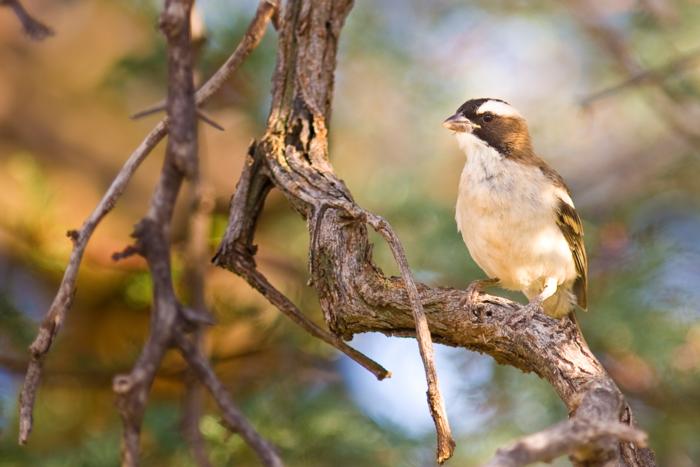Desert birds lay larger eggs when they have more helpers to feed their chicks, new research shows.

Credit: Andrew Young
Desert birds lay larger eggs when they have more helpers to feed their chicks, new research shows.
White-browed sparrow weavers live in family groups in which only a dominant pair breeds and their grown-up offspring, particularly females, help to feed nestlings.
The study, by researchers at the University of Exeter, found that mothers increased the size of their eggs when they had more female helpers on hand.
The number of male helpers did not affect egg size, probably because male helpers feed chicks at substantially lower rates than female helpers.
“We don’t yet fully understand why helped mothers are laying heavier eggs, but our results point towards one likely explanation,” said lead author Dr Pablo Capilla-Lasheras, now at the University of Glasgow.
“Helpers may allow mothers to invest more in offspring at the egg stage by lightening maternal workloads at the chick-feeding stage.
“Our findings support this, as mothers with more female helpers did indeed enjoy significantly lighter workloads at the chick-feeding stage.”
This study is one of the first to show that mothers in cooperatively breeding birds actually change the size of their egg according to their social environment.
“Helpers feed offspring after they hatch in birds, or are born in mammals, but our findings highlight that helpers could have hitherto unexplored beneficial effects on offspring even before they are born, by triggering an increase in maternal investment before birth,” said DrAndy Young, senior author on the study at the University of Exeter.
“This discovery has potential implications for other cooperative species too, including ourselves, because this maternal strategy of increasing investment in offspring before birth when helped, whether in the egg or in the womb, could be something that occurs more widely across cooperative species.”
These findings stem from a remarkable continuous decade-long field study of 40 family groups of sparrow weavers in the Tswalu Kalahari Reserve, South Africa.
The environment is harsh, with unpredictable patterns of rainfall, and it is thought that the birds’ cooperative breeding strategy helps to reliably rear chicks despite these conditions.
Nearly 10% of the world’s birds have non-breeding “helpers” of this kind.
Sparrow weavers are among the most cooperative of birds, however, with breeding pairs being assisted by up to 10 helpers.
Remarkably, the helpers completely forego their own reproduction, remaining within their family as non-breeding adults for up to six years, helping to rear their parents’ young.
The study was funded by the Biotechnology and Biological Sciences Research Council (BBSRC).
The paper, published in the journal PLOS Biology, is entitled: “Mothers in a cooperatively breeding bird increase investment per offspring at the pre-natal stage when they will have more help with post-natal care.”
Journal
PLoS Biology
DOI
10.1371/journal.pbio.3002356
Method of Research
Observational study
Subject of Research
Animals
Article Title
Mothers in a cooperatively breeding bird increase investment per offspring at the pre-natal stage when they will have more help with post-natal care
Article Publication Date
9-Nov-2023




